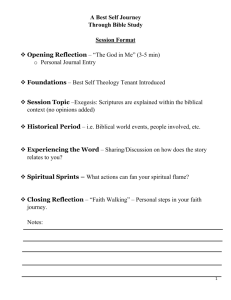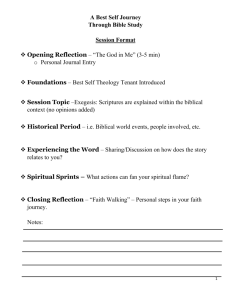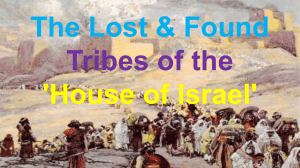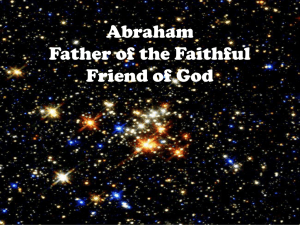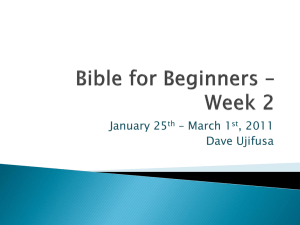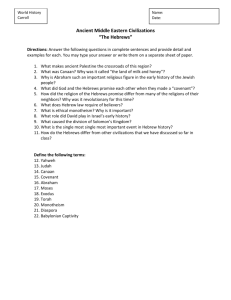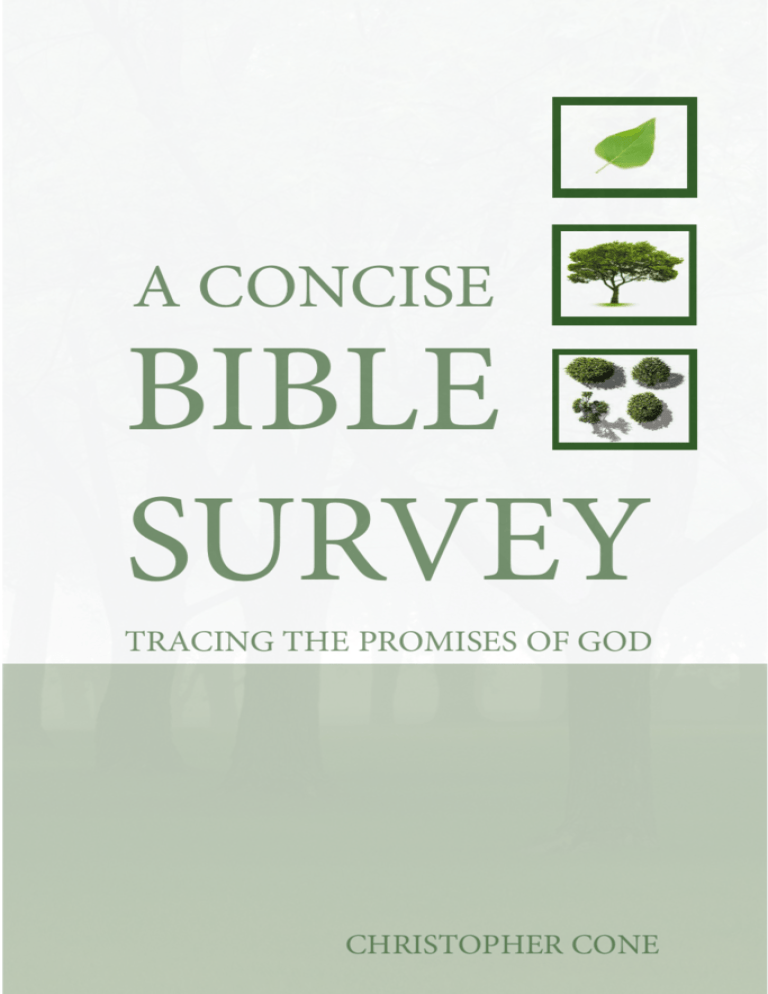
A CONCISE
BIBLE
SURVEY
TRACING THE PROMISES OF GOD
CHRISTOPHER CONE
A Concise Bible Survey: Tracing the Promises of God
Electronic edition
4th Edition 2012
©2012 Christopher Cone
Exegetica Publishing
Ft. Worth, TX
1st-3rd Edition’s published as The Promises of God: A Synthetic Bible Survey
ISBN-10: 0976593025
ISBN-13: 978-0-9765930-2-7
All rights reserved. No part of this publication may be reproduced, stored in a
retrieval system, or transmitted in any form or by any means – electronic,
mechanical, photocopy, recording, or any other – except for brief quotation in
printed reviews, without the prior permission of the publisher.
All Scripture quotations, except those noted otherwise are from the New
American Standard Bible, ©1960,1962,1963,1968,1971,1972,1973,1975, and 1977
by the Lockman Foundation.
Studying the Bible is like studying the forest and the trees. Exegesis
examines the detail of every leaf.
Systematic theology categorizes every kind of tree.
Synthetic survey takes a bird’s eye view of the whole forest. Without that
broad perspective, we don’t know where the leaves fit, and we can’t begin
to fathom how many different kinds of trees there really are.
Can you see the forest from the trees?
Enjoy the forest...
Affectionately dedicated to
My cherished Cathy – Thank you for who you are to me, and for making this possible. Your love for the Lord brings me joy.
Many have done nobly, but you excel them all.
I love you.
and
My adored Christiana & Cara Grace– I pray that this will help you both as you seek His face. I hope that it adds to your
joy in studying His Word, and that through it, in some small way, I may pass along to you an example of His love, as my
blessed parents have tirelessly done for me. I love you.
With special thanks to
Ralph, Lucy and KC Cone,
When I glance at the pages of Scripture, I am reminded of your gift to me. You taught me to love the Lord and to cherish
His word. There is no greater gift that parents and a brother could have given. My heart has been shaped by your
examples and by your love. I only pray that I could be such a blessed influence to others. I owe you a debt of love.
Table of Contents
Introduction
1
1 Promises Previewed: Chronology of the Hebrew Bible
3
2 Promises Made: Conscience and Theocracy
9
Genesis
11
Job
29
Exodus
32
Leviticus
38
Numbers
44
Deuteronomy
47
Joshua
52
3 Promises Ignored: Theocracy Rejected
57
Judges
58
Ruth
61
4 Promises Expanded: Monarchy
65
1 Samuel
67
2 Samuel
69
1 Chronicles
73
1 Kings
75
2 Kings
79
2 Chronicles
81
Psalms
83
Proverbs
87
Ecclesiastes
90
Song of Solomon
93
Obadiah
96
Joel
98
Jonah
103
Amos
106
Hosea
108
Micah
110
Isaiah
112
Zephaniah
115
Nahum
116
Habakkuk
117
Jeremiah
118
5 Promises Delayed: Exile
123
Lamentations
124
Ezekiel
125
Daniel
130
6 Promises Kept: Return and Restoration
139
Ezra
140
Haggai
142
Zechariah
143
Esther
145
Nehemiah
147
Malachi
149
7 Promises Distinguished: Israel and the Church
151
8 Promises Expounded: Preparing for the Church Age
163
9 Promises Embodied: The Earthly Ministry of Christ
169
Matthew
174
Mark
179
Luke
184
John
188
10 Promises Illustrated: The Bride of Christ
193
Acts
194
James
203
1 Thessalonians
206
2 Thessalonians
208
1 Corinthians
209
2 Corinthians
211
Galatians
212
Romans
215
Philippians
221
Philemon
223
Ephesians
224
Colossians
228
1 Timothy
230
Titus
232
2 Timothy
234
Hebrews
235
1 Peter
238
2 Peter
240
Jude
241
1 John
243
2 John
245
3 John
246
11 Promises Fulfilled: The Summation
Revelation
247
248
TRACING THE PROMISES OF GOD
1
Introduction
The Bible is an amazing book. It has been circulated more, read
more, and discussed more than any other book in all of history.
But it is more than just a book. It is more than just a compilation
of stories and narratives and morals and poems. God’s word is an
orderly communication of Himself, and to specific ends. God seeks
to be known. After all, John 17:3 tells us that the true meaning of
life – even the very definition of life – is to know God. The Bible,
therefore, is God’s revelation of Himself to mankind, in order that
His character may be clearly demonstrated, seen, and to whatever
degree He desires, understood.
We are told that all Scripture is God-breathed (2 Tim. 3:16).
Consequently the value of examining the words of Scripture is
great, for they are His words – His own accounting of Himself and
His plan. His creative work is evident to all, and much of His
character and person can be seen in creation itself. As the Psalmist
says, “the heavens are telling of the glory of God” (Ps. 19:1). But
yet, He has graciously given us so much more than even the artful
creation before us. He has graced us with the His word of truth,
that which is useful for teaching, for reproof, for correction, for
training in righteousness. For how shall we come to Him if we are
not told of Him, and who shall tell us of Him if He does not tell us
Himself? But He does tell us. And just as in creation we see
patterns and organization, we see the same themes of sovereignty,
holiness, and grandeur running throughout the Bible.
Connecting these themes is an important thread running
through the entire Scriptures. That thread is a key to
understanding Scripture as one clear and cohesive message. It
guides us from the opening words of Genesis to the closing Amen of
Revelation, and ties them together so beautifully that it is evident
that only God could be the author of such an incredibly divine
symphony of life.
God’s promises and the fulfillment of those promises provide
the basic structure and outline of God’s communication with man
in the Bible. Not only does a Bible survey based on the promises of
God give us an outline of Scripture, but it also provides an outline
2
A CONCISE BIBLE SURVEY
of world history itself - including past, present, and future.
Through understanding the promises of God, we get a glimpse of
the glory of the covenant-keeping God.
Many other signs therefore Jesus also performed in the
presence of the disciples which are not written in this
book; but these have been written that you may believe
that Jesus is the Christ, the Son of God; and that
believing you may have life in His name.
John 20:30-31
Meaning of Bible: From the Greek singular noun biblos, referred to the 11th century use in Egypt of the
outer surface of a papyrus reed for writing. Christians later used the plural biblia to describe their
writings as early as 100AD. This term was transliterated into Old French, and later, modern English.
TRACING THE PROMISES OF GOD
3
1
Promises Previewed
The Chronology of the Hebrew Bible
The books of the Hebrew Bible can be categorized into four
different categories: Chronological, Complementary, Wisdom, and
Prophetic.
CHRONOLOGICAL BOOKS - There are eleven such books,
forming the backbone of the Hebrew Bible, covering 3600 years in
chronological order. One leads into the next, and read one after the
other, they cover the entire chronology of the Hebrew Bible.
Genesis – (4004-1900) – creation, Noah, Abraham, Isaac, Jacob,
and Joseph.
Exodus – (1525-1440) – the conclusion of Israel’s enslavement in
Egypt, the Exodus, and the Mosaic Covenant.
Numbers – (1440-1400) – Israel’s 40 years in the wilderness, the
two numberings, one before the wandering, one after.
Joshua – (1400-1370) – Israel’s swift, yet incomplete conquest of
Canaan.
Judges – (1370-1050) – covers the years that judges ruled Israel.
1 Samuel – (1100-1011) – the call of Samuel, the reign of Saul,
and the early life of David.
2 Samuel – (1011-971) – the reign of David as king over Israel.
1 and 2 Kings – (971-586) – Solomon’s kingdom, the divided
kingdom, and the beginning of the exile.
Ezra – (538-450) – the spiritual restoration of Israel from the
exile.
Nehemiah – (445-433) – the political restoration of Israel from the
exile, and chronologically ends the Old Testament.
4
A CONCISE BIBLE SURVEY
COMPLEMENTARY BOOKS – They contain historical accounts,
and cover time periods contemporary to the Chronological Books.
The events of Job occur during the time of Genesis.
Leviticus is contemporary to Exodus.
Deuteronomy records the second giving of the Law occurring
chronologically in the book of Numbers.
Ruth lived during the times of the judges.
1 Chronicles covers the events of 2 Samuel from a priestly
perspective.
2 Chronicles deals with the events of 1 and 2 Kings from a
priestly perspective.
The events of Esther took place after the exile.
WISDOM BOOKS – These books were written or compiled
primarily during the Monarchy and Divided Kingdom.
Psalms – written primarily by David, some by Asaph, Moses,
Solomon, and others.
Proverbs – wisdom verses primarily from the pen of Solomon.
Ecclesiastes – an examination by Solomon of the meaning of life.
Song of Solomon – a portrait of marital love, also by Solomon.
PROPHETIC BOOKS – five groups of prophetic books written
during the Monarchy, Divided Kingdom, and Exile:
A. Prophets to the Nations
Obadiah (840) – message of judgment to Edom.
Jonah (780) – a call for repentance to Ninevah.
Nahum (650-612) – oracle of judgment against Ninevah.
B. Prophets to the Northern Kingdom of Israel
Amos (755) – judgment, a call to repentance, and promise
of future restoration.
Hosea (750) – a vivid portrait of God’s love toward Israel,
despite her unfaithfulness.
TRACING THE PROMISES OF GOD
5
C. Prophets to the Southern Kingdom of Judah
Joel (835) – judgment, deliverance, the Day of the Lord,
and future blessing.
Micah (725) – judgment on the North and South, rebuke of
the leaders, and future hope.
Isaiah (740-680) – the rejection and restoration of Israel by
God, and the coming of Messiah.
Zephaniah (625) – the Day of the Lord: a day of wrath, and
a day of restoration.
Habakkuk (609) – questions of God’s sovereignty in
dealing with Israel.
Jeremiah (627-586) – final pronouncements of judgment,
promises of future blessing.
D. Prophets during the Exile
Lamentations (586) – Jeremiah’s mourning over the fall of
Jerusalem.
Ezekiel (593-570) – the sovereignty of God, judgment on
Israel, and the future hope of the Kingdom.
Daniel (536) – God’s deliverance of His people, and the
timelines.
E. Prophets during the Restoration
Haggai (520) – encouragement to complete the temple.
Zechariah (520-518) – visions, messages, and burdens of
hope and redemption for Israel.
Malachi (450-400) – rebuke of priests, and promise of the
forerunner.
6
A CONCISE BIBLE SURVEY
The Hebrew Bible*
1. The Torah (Law):
Genesis, Exodus, Leviticus, Numbers,
Deuteronomy
2. The Nevi’im (Prophets):
A. The Former: Joshua, Judges, Samuel,
Kings
B. The Latter: Isaiah, Jeremiah, Ezekiel,
The Twelve (Hosea, Joel, Amos, Obadiah,
Jonah, Micah, Nahum, Habakkuk,
Zephaniah, Haggai, Zechariah, Malachi)
3. The Ketuvim (Writings):
A. Psalms, Proverbs, Job
B. Megillot (Scrolls): Song of Solomon,
Ruth, Lamentations, Ecclesiastes, Esther
C. Daniel, Ezra-Nehemiah, Chronicles
*Collectively referred to as the TaNaK, an acronym of the
three sections.
Ruth
Judges
The Chronology
Of the
Hebrew Bible
Proverbs, Ecclesiastes,
Song of Solomon
Joel
Micah
Isaiah
Zephaniah
Habakkuk
Jeremiah
Southern
Obadiah Jonah Nahum
971-586
535-450
Nehemiah
445-432
Haggai
Zechariah
Malachi
Restoration
Esther
Ezra
Lamentations
Ezekiel
Daniel
Exile
1 and 2 Kings
1 and 2 Chronicles
1 and 2 Samuel
1100-971
To The Nations
Amos
Hosea
Northern
Joshua
Prophetic
Books
Leviticus Deuteronomy
Numbers
Psalms
Job
Complementary
Books
Exodus
Wisdom
Books
Genesis
4004-1900 1525-1440 1440-1400 1400-1370 1370-1050
Chronological
Books
Timeline
TRACING THE PROMISES OF GOD
7
8
A CONCISE BIBLE SURVEY
TRACING THE PROMISES OF GOD
9
2
Promises Made
Conscience and Theocracy
4004-1370 BC
Chronological Books
Genesis
Exodus
Numbers
Joshua
4004-1900 BC
1525-1440 BC
1440-1400 BC
1400-1370 BC
Complementary
Books
Job
Leviticus
Deuteronomy
Key Promises
The First Promise: The Need For Redemption -----------Gen. 2:15-17
The Redemptive Promise: Suffering Messiah ---------Gen. 3:15
(3:21; 4:1,25)
The Noahic Covenant --------------------------------Gen. 8:21-9:17 (6:5-8)
The Abrahamic Covenant---------------------Gen. 12:1-3, 15:3-21 (45:5)
The Egyptian Exile and Exodus---------------Gen. 15:13-14 (45:5); Ex.
6:2-8; 12:12-13,40
The Land Covenant ------------------- Gen. 15:18-21; Deut 30, Josh 24
Regarding Ishmael -------------------Gen. 16:10-14, 21:9-21 (17:17-21)
Regarding Isaac --------------------------------------------------Gen. 17:17-21
10
A CONCISE BIBLE SURVEY
Regarding Jacob and Esau ------------------------------Gen. 25:22-23
To Jacob----------------------------------------------Gen. 28:10-17 (49:10)
Regarding Judah: Tribe of Royalty ------------------------Gen. 49:10
The Mosaic Covenant --------------------------------------------Ex 20-24
The Wilderness Exile ------------------------------------Num. 14:28-35
The Exile From The Promised Land----------Lev. 25:1-4; 26:1-46;
Deut. 28-30 (9:4,6) (15:4-5,11)
Failed Conquest --------------------------------------------Josh. 23:11-13
TRACING THE PROMISES OF GOD
To Jacob
To Joseph
28-36
37-50
25:12-27:46 To Isaac
To Abraham
12-25:11
11 The Tower Of Babel
4004-1800 BC
5-10 Noah & The Flood
The Fall
3
4 Abel, Cain & Seth
Creation
1-2
GENESIS
11
Genesis: God Relates To Man
Key Promises
The First Promise: The Need for Redemption ------------Gen. 2:15-17
The Redemptive Promise: A Suffering Messiah --------------Gen. 3:15
The Noahic Covenant ------------------------------------------Gen. 8:21-9:17
The Abrahamic Covenant -----------------------------Gen. 12:1-3; 15:3-21
The Egyptian Exile and Exodus -----------------------------Gen. 15:13-14
The Land Covenant ---------------------------------------------Gen. 15:18-21
Regarding Ishmael -----------------------------------Gen. 16:10-14; 21:9-21
Regarding Isaac --------------------------------------------------Gen. 17:17-21
Regarding Jacob and Esau ------------------------------------Gen. 25:22-23
To Jacob -------------------------------------------------------------Gen. 28:10-17
Regarding Judah: Tribe of Royalty------------------------------Gen. 49:10
12
A CONCISE BIBLE SURVEY
Title
The Hebrew title of the book is bereshith (the first word in the
Hebrew text), meaning in the beginning. Genesis is from the Latin
translation of this word and is also related to the Greek root genos,
referring to lineage and beginnings.
Authorship
Moses’ authorship of the Torah (or Pentateuch - the first five
books of the Bible) is affirmed throughout Scripture. The Biblical
interpreter using the literal grammatical-historical interpretive
method will conclude that Moses was indeed the author.
There are numerous claims within the Torah of Mosaic
authorship1 as well as other Hebrew Bible books containing
statements to the same effect.2 Further, Christ Himself identified
Moses as the writer of the first five books on more than 15
recorded occasions.3 Most significantly in Luke 24:44 He refers to
the entire Hebrew Bible, divided as the Jews of that day
recognized into three categories: “the Law of Moses and the
Prophets, and the Psalms.”
Only in recent years has Mosaic authorship of these books been
challenged and most notably so by Julius Wellhausen (1844-1918).
Wellhausen argued for the Documentary Theory, also known as
the JEDP theory – a theory that suggested several men as being
responsible for the authorship of the Torah:
“J” is for “Jahwist,” as this supposed author seemed to prefer to
use the name Jehovah (in Hebrew, Yahweh) for God. This author
wrote in approximately 850 BC.
“E” is for “Elohist,” as this author penned the Hebrew word
Elohim when referring to God. He wrote around 750 BC.
“D” is for “Deuteronomist,” the unnamed redactor of 650 BC
who edited and combined documents “J” and “E,” arriving at the
deuteronomic account.
“P” is for the “Priestly” author, primarily of Leviticus, but of
other priestly and institutional sections as well.
TRACING THE PROMISES OF GOD
13
This form of criticism assumes that because there are
variances in the writing ‘style’ and because there is found within
these books a very broad range of subjects, time, and information
covered, that it could not possibly be the work of just one author,
and the theory dismisses completely the idea of God’s inspiring
and revealing work.
While Wellhausen was not the primary originator of this
theory, he seemed to be it’s loudest defender. And the issue at
stake is not simply the question of who wrote these books. The
process by which Wellhausen and others arrive at their
conclusions is a dangerous one, as Gleason Archer points out:
The Documentary Theory has been characterized by a subtle
species of circular reasoning; it tends to posit its conclusion
(the Bible is no supernatural revelation) as its underlying
premise (there can be no such thing as supernatural
revelation)…Unfortunately…it rendered impossible any fair
consideration of the evidences presented by the Scripture of
supernatural revelation. Furthermore, it made it absolutely
obligatory to find rationalistic, humanistic explanations of
every miraculous or God-manifesting feature or episode in
the text of Scripture.4
It is imperative for the Bible student to recognize the conflict
between Biblical claims and the claims of liberal criticism. They
are mutually exclusive. As a result, we must make a choice to
either acknowledge God’s sovereign and supernatural work in
revealing Himself or to thoroughly discount it.
But again, despite any lack of clarity in the arguments or
intentions of the critics of Mosaic authorship, the Bible stands
clear in its testimony that Moses was the mouthpiece chosen by
God to pen the Torah.
14
A CONCISE BIBLE SURVEY
Structure
In addition to the topical divisions of Genesis (as shown in the
outline chart) the book is also divided into twelve sections, each
one (except for the first) beginning with the Hebrew word toledoth
(the generations of). The toledoth divisions are as follows:
1. Creation 1:1 - 2:3 (no toledoth introduction)
2. The account of the heavens and the earth 2:4 - 4:26
3. The book of the genealogy of Adam 5:1 - 6:8
4. The genealogy of Noah 6:9 - 9:29
5. The genealogy of the sons of Noah 10:1 -11:9
6. The genealogy of Shem 11:10-26
7. The genealogy of Terah (Abraham) 11:27 - 25:11
8. The genealogy of Ishmael 25:12-18
9. The genealogy of Isaac 25:19 - 35:29
10. The genealogy of Esau 36:1-8
11. The genealogy of the sons of Esau 36:9-43
12. The genealogy of Jacob 37:1 - 50:26
Genesis 1 -11
God Relates to Man in General
The first eleven chapters of Genesis give us the account of
God’s dealings with mankind in general. Throughout these first
chapters, we see God beginning to hone in on specific people
through whom He will work His master plan. Genesis 1-2 records
the account of creation, and chapter two is highlighted by God’s
first promise to man:
And the Lord God commanded the man saying, ‘From any
tree of the garden you may eat freely; but from the tree of
the knowledge of good and evil you shall not eat, for in the
day that you eat from it you shall surely die’ (2:16-17).
TRACING THE PROMISES OF GOD
15
At this early stage in history Adam and Eve had life – they
knew God intimately and had a beautiful fellowship with Him.
That fellowship was to be maintained and protected simply by
obeying one imperative.
Genesis 3 gives us the account of Adam and Eve’s failure to
keep this command. The consequence was death – immediate
spiritual death, and eventual physical death. God had kept His
first promise. Mankind was immediately separated from fellowship
with God – further demonstrated by God when He banished the
first couple from the Garden of Eden. The fellowship was
irrevocably destroyed, and man had no ability to correct it. But
even in the tragedy of God’s pronounced judgment, He made
another promise:
And I will put enmity between you [the serpent] and the
woman, and between your seed and her seed; He shall
bruise you on the head, and you shall bruise Him on the
heel (3:15).
As God pronounced judgment on the serpent (Satan, see Rev.
12:9; 20:2), He declared that the seed of woman would execute this
very judgment. Note that seed here is singular – it references a
specific descendant. It later becomes evident that this promise
would provide the means to restore the fellowship between God
and His created beings. With each promise made in Scripture,
God’s plan becomes clearer. In the beginning, the promises seem
vague and somewhat mysterious, but as Scripture progresses we
find the promises explicitly specific.
Genesis 4 records the tragic murder of Abel by his brother
Cain, and again – even as God is judging the wickedness of Cain
He makes another promise of deliverance, this one specifically for
Cain (4:15). Genesis 5 gives us the record of the descendants of
Adam through Noah – the next man to whom God would make a
promise. Genesis 6 begins with God’s lament over what mankind
had become:
16
A CONCISE BIBLE SURVEY
Then the Lord saw that the wickedness of man was great on
the earth, and that every intent of the thoughts of his heart
was only evil continually (6:5).
The evil on earth had become so great that God would no
longer tolerate it. He could perhaps have blotted out mankind
entirely and started over – but remember, He had made a promise
of deliverance (3:15) that He must keep. God keeps His promises,
so God chose a man through whom the thread would continue.
That man was Noah.
God’s promises do not fail. Even though God would judge
mankind by flood, He kept His promise. Genesis 7-8 records the
events of the flood and how God remembered the righteousness of
Noah, and how He used Noah to save a remnant of the human
race, in order to keep His promise. In Genesis 8 God makes
another promise, this one to Noah. The Noahic Covenant is
comprised of two parts:
First is the element of the promise that God made to Himself:
And the Lord said to Himself, ‘I will never again curse the
ground on account of man, for the intent of man’s heart is
evil from his youth; and I will never again destroy every
living thing, as I have done; while the earth remains,
seedtime and harvest, and cold and heat, and summer and
winter, and day and night shall not cease’ (8:21b-22).
At this point we now know that God will spare human life and
the continuous cycle of life until He has accomplished His purpose
– which includes keeping His promises.
Second is the covenant God makes with Noah:
‘…And I establish My covenant with you; and all flesh shall
never again be cut off by the water of the flood, neither shall
there again be a flood to destroy the earth’ (9:11).
TRACING THE PROMISES OF GOD
17
God then refers to this covenant as an “everlasting covenant
between God and every living creature of all flesh that is on the
earth.” Once again, God makes Himself accountable to creation by
giving His word that He will not destroy the earth by flood ever
again. Just ponder the grace of God: He has all the intrinsic power
as the Creator and the Almighty, yet He limits (by the promises in
His word) what He can and will do. This is a theme evident
throughout the Bible: God willingly limits Himself. By His
declaration that He will do one thing, He eliminates the possibility
that He will do the opposite. And so it is that the Almighty God
reaches down to us.
It should also be noted, if only in passing at this point, that the
Noahic Covenant also includes some other significant points,
including permission to eat meat (9:3-4), and a mandate for capital
punishment as the consequence for murder (9:6).
Genesis 10 continues on to trace the progeny of Noah. He had
three sons: Shem, Ham, and Japheth.
These are the families of the sons of Noah, according to their
genealogies, by their nations; and out of these the nations
were separated on the earth after the flood (10:32).
Mankind grew numerous and mighty in unity. Genesis 11
records man’s continued defiance of God:
And they said, ‘Come let us build for ourselves a city, and a
tower whose top will reach into heaven, and let us make for
ourselves a name; lest we be scattered abroad over the face of
the whole earth’ (11:4).
This was a direct violation of God’s command to be fruitful and
multiply and fill the earth (1:28; 9:1), and it resulted in God taking
unique action once again to further His plan. Genesis 11 records
the events at the Tower of Babel, where God confused man’s
languages and destroyed their unity, forcing them to scatter and
once again submit to the will of the Almighty God.
18
A CONCISE BIBLE SURVEY
The chapter closes with the genealogy of Shem, differing from
the genealogy in chapter ten only in that it traces a specific line –
the line to Abraham. It is Abraham who would be the instrument
God would use to bless all of humanity and keep His promise.
The first eleven chapters of Genesis record God dealing with
humanity as a whole. Even the covenant God made with Noah
impacted all of creation. Up to this point, God had still not yet
made it clear how or through whom He intended to keep His
promise of deliverance and redemption, but it is in Genesis 12 that
the outline of Scripture truly begins to take shape. Out of the
shadows emerges God’s grand plan of the ages.
Table of Early Nations
Nation 3000 2500
Sumerians
Canaanites/
Amorites
2000
1500
3000-2000
3000-1450
2300-Present
Israelites
Assyrians
Arameans
2500-612
2500-700
2300-Present
Egyptians
Ammonites
2500-581
2000-539
Babylonians
Philistines
2000-1000
2000-165
Edomites
1900-1180
Hittites
Moabites
Phoenecians
Persians
1000 500 300 0
1300-600
1200-332
800-424
TRACING THE PROMISES OF GOD
19
Genesis 12:1-3
The Abrahamic Covenant
If there is a single passage which provides the setting for the
remainder of Scripture, it is Genesis 12:1-3, God’s promise to
Abraham. In the previous chapters of Genesis, God dealt with
mankind on a more general basis. In chapter twelve He chooses
one man and directs all of His work with mankind through one
promise – the Abrahamic Covenant:
Now the Lord said to Abram, ‘Go forth from your country,
and from your relatives and from your father’s house, to
the land I will show you; and I will make you a great nation
and I will bless you, and make your name great; and so you
shall be a blessing; and I will bless those who bless you,
and the one who curses you I will curse. And in you all the
families of the earth shall be blessed’ (12:1-3).
It is important to note that while this covenant was indeed
unconditional (once ratified, it was not dependent upon anyone
other than God, since He instituted no conditions which could
negate the promises He made), it did hinge initially upon
Abraham’s obedience to the imperative “Go forth from your
country, and from your relatives and from your father’s house to
the land which I will show you.” Abraham was told essentially to
leave all that he had known and if he was obedient to this one
thing, the covenant would be set in motion. He did, and it was.
The Abrahamic Covenant contains seven specific promises with
three general elements.
The seven promises are:
1. I will make you a great nation.
2. I will bless you.
3. [I will] make your name great.
4. You shall be a blessing.
5. I will bless those who bless you.
20
A CONCISE BIBLE SURVEY
6. The one who curses you I will curse.
7. In you all the families of the earth shall be blessed.
The three general elements are:
1. people
2. land
3. kingdom
The Promises
1. I will make you a great nation.
This promise requires that the three elements be in place – a
nation cannot be great without people, land, and a kingdom. God’s
promise entailed innumerable descendants for Abraham, a
splendid land (which God would show him), and what would
ultimately be an eternal kingdom.
2. I will bless you.
The promises were not general as God’s promises were
previously. Rather than being aimed at mankind as a whole, this
promise was directed at a specific individual.
3. [I will] make your name great.
The blessing upon Abraham would be so magnificent that his
name would be highly regarded and meaningful in the ages to
come.
4. You shall be a blessing.
Not only would Abraham himself be blessed, but also he would
be a blessing to others. In what specific ways and to whom is not
defined here, but at the end of 12:3 this blessing shall be expanded
and further defined.
TRACING THE PROMISES OF GOD
21
5. I will bless those who bless you.
In addition to the blessings for Abraham and those whom he
would be a blessing to, there was a special blessing from God for
those who also blessed Abraham. Abraham would hold a special
place in the heart of God, and be treated with unique esteem.
6. The one who curses you I will curse.
In contrast to the blessing for those who bless Abraham is a
curse for those who curse him. This will become evident as nations
are judged harshly for their treatment of the nation that Abraham
fathered.
7. In you all the families of the earth shall be blessed.
This seventh promise affects not just those who bless or curse,
but it will impact people from every nation. Again, no specifics are
yet given, but it is evident that not only would Abraham be a
blessing (the fourth promise) but through him the entire world
would be blessed. It is in this seventh promise that God’s earlier
promise of redemption (Genesis 3:15) would be kept.
The Elements
1. People
Genesis 13:16 expands on this element:
And I will make your descendants as the dust of the earth;
so that if anyone can number the dust of the earth, then
your descendants can also be numbered.
2. Land
Genesis 13:14-15 is more specific regarding this element:
…Now lift up your eyes and look from the place where you
are, northward and southward and eastward and westward;
22
A CONCISE BIBLE SURVEY
for all the land which you see, I will give it to you and to
your descendants forever.
Also Genesis 15:18:
…To your descendants I have given this land, from the river
of Egypt as far as the great river, the river Euphrates…
The land element is further expanded in Deuteronomy 30.
3. Kingdom
Explanation of this element is not found with specificity until it
is completely unfurled in the Davidic Covenant of 2 Samuel 7.
From this point forward, every word of Scripture points forward to
the gradual, literal, and complete fulfillment of each of the
promises in this covenant.
Genesis 12:1-25:11
God Relates To Abraham
God initiated His relationship with Abraham by making a
covenant with him. Genesis 12:1-25:11 contains the account of the
rest of Abraham’s life – an account that further illustrates God’s
character as the Covenant Keeper.
God tells Abraham to leave his home and follow God to a land
that God would show him. Abraham was faithful in this, yet he
shows his weakness in other areas. For example, in chapter 12 he
does not trust God to protect him from the Egyptians, so he lies. In
chapter sixteen, Abraham does not trust God to provide him with a
son as promised. As a result he takes his wife’s Egyptian maid as a
concubine and she bears him a son, named Ishmael. God had
promised to bless Abraham’s descendants, and He indeed would
bless Ishmael. Abraham’s lack of trust would cause strife for
thousands of years between the descendants of Ishmael and those
of Isaac. In spite of Abraham’s initial lack of trust, God kept His
promise, and in Genesis 21 Isaac is born.
TRACING THE PROMISES OF GOD
23
Even at this point, God was not finished teaching Abraham
about faith. In Genesis 22 God tells Abraham to sacrifice Isaac as
an offering to God. It is worth noting that never elsewhere in
Scripture does God request physical human sacrifice (as was the
practice of other pagan religions during Abraham’s day). God was
simply putting Abraham’s faith to the test in terms he could
understand, as well as providing a powerful illustration of His plan
of salvation for man.
Even though he didn’t yet know what God had in store,
Abraham was faithful in this. As he was about to commit the act,
the Angel of the Lord (the pre-incarnate Christ, Himself) stops him
and shows him a ram in the thicket that would take Isaac’s place.
God provided an important picture of the work He would
accomplish in order to bring fallen mankind back to Himself: He
would give His only Son as a sacrifice. The ram in the thicket was
a substitute for Isaac. Isaac was to die, but by the grace of God
there was a substitute. As Scripture unfolds, it will soon become
clear that Jesus Christ is the Substitute – the Redeemer who
would pay for man’s sin.
As Abraham’s life comes to a close, he was “satisfied with
life” (25:8), as the Lord had blessed him greatly. Even though he
was not the perfect example of faith, he was an example
nonetheless. Abraham began to understand that God would keep
His promises, and even as he saw them begin to unfold in his
lifetime (with the birth of Isaac, etc.), there was indeed much more
to come. Through Abraham the promises of God can be traced, and
the thread continues with Isaac.
Genesis 15:13-14
The Egyptian Exile and Exodus
As God ratifies His covenant with Abraham, He adds a bit of
strange news:
Know for certain that your descendants will be strangers in
a land that is not theirs, where they will be enslaved and
oppressed four hundred years. But I will also judge the
24
A CONCISE BIBLE SURVEY
nation whom they serve; and afterward they will come out
with many possessions (15:13-14).
Why, after promising to give Abraham’s descendants the land
would God pull them out again? He says in verse 16 that the “the
iniquity of the Amorite is not yet complete.” Amazingly, even
amidst the wickedness of nations, God shows incredible patience.
There was an allotted amount of sin that God would allow the
Amorites to commit, and then it would be over. At the right time
He would restore the descendants of Abraham to the land, thereby
judging the Amorite. That promise is fulfilled in Egypt shortly
after Joseph’s time.
Genesis 15:18-21
The Land Covenant
God adds yet another measure of precision to His covenant
with Abraham when He says,
To your descendants I have given this land, from the river of
Egypt as far as the great river, the river Euphrates: the
Kenite and the Kenizzite and the Kadmonite and the Hittite
and the Perizzite and the Rephaim and the Amorite and the
Canaanite and the Girgashite and the Jebusite (15:18-21).
The Land Covenant unquestionably required a literal and physical
fulfillment. The boundaries included in this promise are
boundaries that Israel to this day has never attained. But God
demonstrates patience and a methodical accomplishment of His
plan to the extent of completion. His promise will not fail. The
descendants of Abraham, through Isaac, will dwell in the land into
eternity.
The specific nations mentioned become significant particularly
when the nation of Israel begins her conquest of the land. How will
Israel handle these nations? Will it be in accordance with the
instruction of the Lord, or will she fall short? This is a key element
TRACING THE PROMISES OF GOD
25
of the history of Israel, and the question is answered in the latter
part of Joshua and the early part of Judges.
Genesis 16:10-14
The Promise Regarding Ishmael
In God’s covenant with Abraham, God promised to bless him
and make a great nation from him. Abraham tried to assist God,
becoming the father of Ishmael. This was a faithless act that would
generate substantial conflict throughout the ages. We often
recognize Abraham for his faith, but we must also not forget his
faithlessness and the consequences it brought.
Because Ishmael was a son of Abraham, God promised to
Hagar, Ishmael’s mother, that He would bless Ishmael:
I will greatly multiply your descendants so that they shall be
too many to count…Behold you are with child, and you shall
bear a son; and you shall call his name Ishmael, because the
Lord has given heed to your affliction. And he will be a wild
donkey of a man, his hand will be against everyone, and
everyone’s hand will be against him; and he will live to the
east of his brothers (16:10-12).
Ishmael would be the father of a great nation, a nation of violence
and strife. An epic ages-long struggle was about to begin.
Genesis 17:17-21
The Promise Regarding Isaac
Ishmael would be blessed by God, but he was not the son
through whom God would carry out His Abrahamic Covenant:
And I will bless her [Sarah], and indeed I will give you a son
by her…and you shall call his name Isaac; and I will
establish My covenant with him for an everlasting covenant
for his descendants after him. And as for Ishmael, I have
heard you; behold I will bless him, and will make him
26
A CONCISE BIBLE SURVEY
fruitful, and will multiply him exceedingly…But My
covenant I will establish with Isaac… (17:16b, 19, 20-21a).
Abraham found the promise of a son born to him and Sarah in
their old age difficult to fathom, yet God had made the promise,
and He intended to keep it. The covenant would be established
through Isaac, not Ishmael. As a result of Abraham’s failure, there
has been war between the descendants of Isaac and Ishmael ever
since, and will be until the Abrahamic Covenant sees its final
fulfillment.
Genesis 25
From Isaac to Jacob
Abraham’s two sons, Isaac and Ishmael would play a vital role
in world history. In chapter twenty-five we find that Ishmael did
indeed become the father of a nation and that he brought strife
early on. “He settled in defiance of all his relatives” (25:18). God’s
promise regarding Ishmael was fulfilled, but it was through Isaac
that God would fulfill His covenant with Abraham. Isaac became
the father of two sons, Esau and Jacob. They were born a very
short time apart from each other, with Esau being the firstborn,
and therefore having the rights of inheritance as the firstborn. But
God had a different plan, as He told Rebekah:
Two nations are in your womb; and two peoples shall be
separated from your body; and one people shall be stronger
than the other; and the older shall serve the younger (25:23).
Esau placed little value on his inheritance, as he willingly gave it
away for some stew (25:25).
Isaac, like his father had a problem with trusting God. He
acted in the same manner as Abraham, lying to protect himself in
Egypt. This lack of trust notwithstanding, God still kept His
promises through these men. As Isaac neared the end of his days
he sought to bless his son Esau, for he loved him. It was through
Esau that Isaac wished for God to keep His promises. But even in
TRACING THE PROMISES OF GOD
27
Isaac’s desire to bless Esau, the sovereignty of God is evident. God
used Jacob’s ambitious and deceptive spirit to place a dying
father’s blessing on Jacob. Isaac, try though he may, could not
alter the will of God.
Once again, God had chosen a man to be chosen, and another
He chose not to be chosen. God at first chose Isaac, and now He
chooses Jacob. As the covenant promises become more specific, so
too does the line through whom they would be kept. That the
covenant promises would be kept through the line of Jacob
becomes even more evident in the next promises God makes.
Genesis 28:10-17
God’s Promise to Jacob
…I am the Lord, the God of your father Abraham and the
God of Isaac; the land on which you lie, I will give it to you
and your descendants. Your descendants shall also be like
the dust of the earth, and you shall spread out to the west
and to the east and to the north and to the south; and in you
and in your descendants shall all the families of the earth be
blessed. And behold, I am with you, and will keep you
wherever you go, and will bring you back to this land; for I
will not leave you until I have done what I have promised
you (28:13-15).
Here the previous covenants are made more specific. It is now
clear that the covenants run through Jacob. Here God reiterates
the Land Covenant, as well as the seventh promise of the
Abrahamic Covenant – that all families of the earth shall be
blessed through Abraham’s seed, and now, specifically through
Jacob’s.
Jacob was also granted a unique relationship with God to this
point, even resulting in his name being changed to Israel
(32:24-28). Israel would become father to twelve sons who would
become the mighty nation named after their father. Through them,
the promises would unfold further still.



